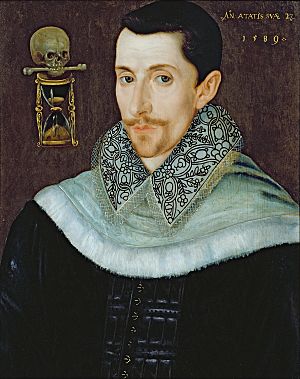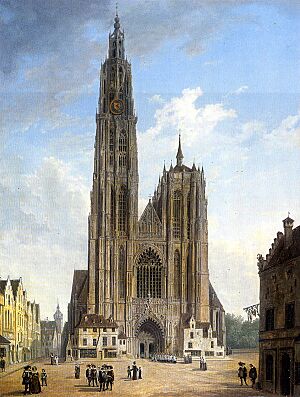John Bull (composer) facts for kids
John Bull (born 1562 or 1563 – died 1628) was a talented English composer, organist, and player of the virginal. He was also an organ builder. He was very well-known for playing keyboard instruments and wrote most of his music for the virginal. He was a key figure in the virginalist school of music.
Life and Career of John Bull
John Bull's exact birthplace is not known for sure. Some researchers think he might have been born in Somerset, while others suggest the Radnorshire area in Wales. What we do know is that he became an organist at Hereford Cathedral in 1582. This might mean he was born in that area, as it was common for musicians to return to their home cathedrals after training.
In 1573, John Bull joined the choir at Hereford Cathedral. The next year, he became part of the Children of the Chapel Royal in London. There, he learned from famous musicians like John Blitheman. Besides singing, he also learned to play the organ.
After his training, Bull became the organist at Hereford Cathedral in 1582. He also became the Master of the Children there, teaching young musicians.
In 1586, he earned a degree from Oxford University. That same year, he became a Gentleman of the Chapel Royal. In 1591, he took over as the main organist at the Chapel Royal after John Blitheman passed away. He received his doctorate degree from Oxford in 1592.
In 1596, Queen Elizabeth I herself recommended him to be the first music professor at Gresham College. Queen Elizabeth admired his musical skills. John Bull traveled to Europe for a long trip in 1601–1602, which was said to be for his health. After Queen Elizabeth died, he worked for King James. He became known as a very skilled composer, keyboard player, and improviser (someone who makes up music on the spot).
Later, in 1607, John Bull had to leave his job at Gresham College and move to Flanders. He married Elizabeth Walter in 1607, and they had a daughter together.
He briefly worked for the court in Brussels. In 1615, Antwerp Cathedral hired him as an assistant organist. By 1617, he became the main organist there. While in Flanders, Bull wrote letters, including one to the mayor of Antwerp. In it, he said he left England because of difficulties related to his religious beliefs.
During the 1620s, he continued his work as an organist and also helped build and advise on organs. John Bull died in Antwerp and was buried on March 15, 1628, near the cathedral.
Famous Musical Works
John Bull was one of the most famous composers of keyboard music in the early 1600s. Only a few others, like Jan Pieterszoon Sweelinck and Girolamo Frescobaldi, were considered more skilled. Many of his keyboard pieces were collected in the Fitzwilliam Virginal Book.
His only published collection of music was Parthenia, which came out in 1612 or 1613. This book contained seven of his pieces and was one of the first collections of music ever printed for the virginal. It was dedicated to Princess Elizabeth, who was his student. The book celebrated her engagement to Frederick V. Other famous composers like William Byrd and Orlando Gibbons also contributed to Parthenia. Bull also wrote an anthem called God the father, God the son for the princess's wedding in 1613.
Besides his keyboard music, he also wrote anthems (songs for church choirs) and canons (a type of musical puzzle where melodies are repeated).
His five-part anthem, Almighty God, which by the Leading of a Star, was very popular during the Jacobean period. It was found in more music collections from that time than any other anthem.
Much of his music was lost or stolen when he left England. However, some of his lost pieces have been found and correctly identified today. One of his most amazing works is a book of 120 canons. These canons show his incredible skill in counterpoint, which is about combining different melodies. Out of the 120 canons, 116 are based on the Miserere tune. He used many clever techniques to change this simple tune, like making it faster or slower, or even playing it backward.
Some of his music in the Fitzwilliam Virginal Book is more playful and has fun titles, such as "A Battle and No Battle," "Bonny Peg of Ramsey," "The King's Hunt," and "Bull's Good-Night."
John Bull is sometimes given credit for composing "God Save the King", which is the national anthem for several countries.
|
See also
 In Spanish: John Bull (compositor) para niños
In Spanish: John Bull (compositor) para niños
- List of Gresham Professors of Music
 | Aurelia Browder |
 | Nannie Helen Burroughs |
 | Michelle Alexander |




